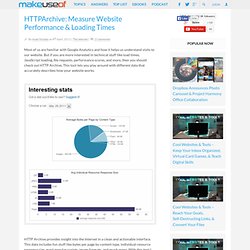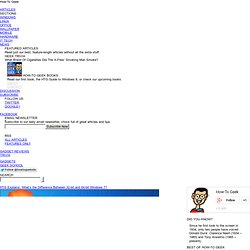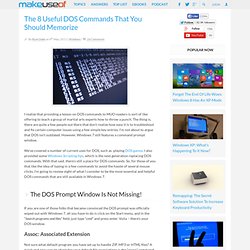

PingBrigade: Ping Any Hostname Online & Measure Response Time. Most of us are familiar with Google Analytics and how it helps us understand visits to our website.

But if you are more interested in technical stuff like load times, JavaScript loading, file requests, performance scores, and more, then you should check out HTTP Archive. This tool lets you play around with different data that accurately describes how your website works. HTTP Archive provides insight into the Internet in a clean and actionable interface. This data includes fun stuff like bytes per page by content type, individual resource response size, most popular scripts, image formats, and much more. With this tool I quickly learned that Google Analytics is the most popular JavaScript snippet on the Internet. HTTP Archive also provides a graph of your website’s performance, including response time, and top requests. Features: Check out HTTP Archive @ www.httparchive.org. William Shatner explains what microprocessors are and do... from way back in 1976. HTG Explains: What’s the Difference Between 32-bit and 64-bit Windows 7? Whether shopping for a new computer or upgrading an old one, you’ve likely come across the the “64-bit” designation and wondered what it meant.

Read on as we explain what Windows 7 64-bit is and why you’d want a piece of that 64-bit pie. Windows 7 has done an enormous amount to increase the popularity of 64-bit computing among home users but many people are unclear on what exactly it means (and may not even realize they’re already running it). Today we’re taking a look at the history of 32-bit and 64-bit computing, whether or not your computer can handle it, and the benefits and shortcomings of using a 64-bit Windows environment. A Very Brief History of 64-bit Computing Before we start dazzling you with interesting history, let’s get the basics down. The register is a small amount of storage used by the CPU where the CPU keeps the data it needs to access the quickest in order for optimum computer performance.
Can Your Computer Handle 64-bits? You can rock radically more RAM. The Best Eleven Websites For Students To Learn About Computers. I’ve gotten into one of my “list-making” moods this week.

I was inspired by a request from Karisa Tashjian (a staffperson at the Rhode Island Family Literacy Initiative) for sites to help English Language Learners with computers, so came up with this one. This list is categorized a little differently from the majority of my other “The Best…” lists. Instead of ranking them from the best to the very best, I’ve picked a couple of sites that each fit into specific sub-categories of knowledge that students would need to have about computers. In order to make it on this list, sites had to be accessible to English Language Learners. In addition, they had to appropriate for adolescent and adult students. You’ll be able to find these links on my website, too. Here are what I think are The Best Eleven Websites For Students and Adults to Learn About Computers (by the way, when I originally posted this list a few hours ago it was the “Best Ten” — I had forgotten to include one site): Mrs. The Best Places To Learn Computer Basics & How To Fix Tech Problems.
I know the title of this “The Best…” list is a mouthful, but it was the best I could come-up with.

I wanted to distinguish it from two previous lists — The Best Places To Learn Web 2.0 Basics — 2007 and The Best Eleven Websites For Students To Learn About Computers. Of course, people who find this list useful might very well want to take a look at those lists, too. I just thought readers of this blog (and me!) Might find it useful to have some good resources where non-tech-savvy people (like myself) can look for help related to technology trouble-shooting and software questions that might not be appropriate for those two lists. To make it on this list, as in most of my “The Best…” lists, a resource must be available at no cost. As usual, I’m certainly open to additional suggestions. Here are my picks for The Best Places To Learn Computer Basics & How To Fix Tech Problems (not in order of preference): Woopid has thousands of video tutorials on computer issues and software.
The 8 Useful DOS Commands That You Should Memorize. We’ve covered a number of current uses for DOS, such as playing DOS games.

I also provided some Windows Scripting tips, which is the next generation replacing DOS commands. With that said, there’s still a place for DOS commands.